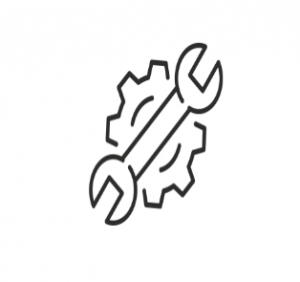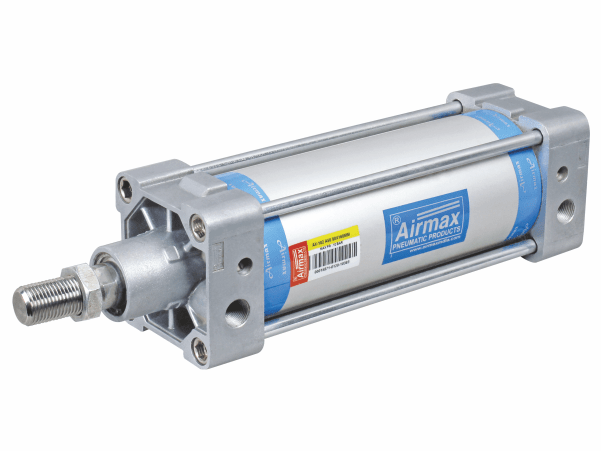In order to make the right decision on which product to choose and how that will affect your throughput, you must understand the differences between the hydraulic and pneumatic cylinder. This article compares the similarities and differences between the two and illustrates why pneumatic cylinders are the better choice in most cases.
In terms of efficiency, speed, and performance reliability, pneumatic cylinders have the edge over hydraulic cylinders, despite both having their advantages and disadvantages. Pneumatic cylinders have the following key advantages over hydraulic cylinders.
A pneumatic system uses pressurized air or gases to provide fluid power. A hydraulic system uses pressurized liquids, such as oil or water, to provide fluid power. Choosing one of the two depends on cost-effectiveness, the materials to be moved, the resources available, and the available space. Equipment that hoists heavy objects, for example, takes up a lot of space and requires more power than small-scale equipment such as robotic laboratories or food processors. Depending on the circumstances, each type of power has its advantages and disadvantages.
1. Hygiene
Pneumatic systems are better in terms of hygiene than hydraulic systems because only air can escape your system. By using a filtration unit, the compressed air will be cleaned of oil, water, metal particles, and any other contaminants. Pneumatic systems are typically preferred by eco-friendly companies or those contemplating greener manufacturing methods.

Also, pneumatics is a good choice if you’re installing systems in a clean room, pharmaceutical laboratory, or food and beverage factory. Due to the possibility of leakage, hydraulic systems are generally off-limits in these environments.
Hydraulic systems can leak either oil or water due to faulty seals, valves, or worn hoses. No matter what safeguards you put in place, this will contaminate your clean environment. Additionally, liquids can cause corrosion of the hardware, introducing contaminants at the same time. At the end of the operational process, residues must be disposed of as well as storage tanks for fluids.
2. Speed
One of the biggest advantages of the pneumatic system is its speed. The high flow rate of compressed air enables the quick release of energy and high-speed motion of moving parts, such as cylinders. The high cycle speeds of pneumatic cylinders can lead to increased productivity. Rapid cylinder movement can further be enhanced by the availability of equipment of very small sizes, which is ideal for miniaturized applications.

Because air has a much lower mass density, it flows through pipes much more quickly and easily. The pneumatic system also offers the advantage of allowing valves and cylinders to quickly change state or direction by dumping their compressed air. No further disposal is required since this can be voided directly into the atmosphere.
Hydraulic oil and water have much greater resistance than air, and the viscosity of oil makes it move more slowly. It may take longer for your system to become operational, even though it will ultimately develop a greater degree of force and maintain constant pressure. When there is a leak or emergency, hydraulic fluid cannot be vented to the environment quickly but must be rerouted to its tank or reservoir.
3. Safety
Pneumatics is undoubtedly the safer option when compared to hydraulics in industrial environments. Air leaks won’t cause contamination since it is neither poisonous nor corrosive, but other gases used in stand-alone or portable equipment may be hazardous. The forcible escape of compressed air through mechanical failure may result in physical injury, but compressed air does not usually pose a fire risk or explode.

Conversely, hydraulic fluids are always susceptible to leaks which can be dangerous. When water is hot enough to scald, even it can cause damage. Corrosive and/or poisonous fluid media include oil, ethylene glycol, plasma, and fluid synthetics. If the fluid media are combustible, extra safety precautions must be taken, and used oil or fluids must eventually be drained and disposed of safely. While hydraulic systems generally have fewer mechanical parts, they may be susceptible to corrosion and component failure.
4. Maintenance
Pneumatic cylinders are a vital component in many industrial machines.
In order to keep these machines running smoothly, it is important to perform regular maintenance on the cylinders. This includes checking for wear and tear, leaks, and other potential problems.
If you don’t regularly maintain your pneumatic cylinders, you could end up with a machine that doesn’t work properly. This could lead to costly repairs or even the replacement of the cylinders. By taking the time to perform regular maintenance, you can avoid these costly problems and keep your machine running smoothly.
How Pneumatic Cylinders Work
A pneumatic cylinder is dependent on an air compressor, which draws atmospheric air into a receiver tank through an intake valve. A high-pressure density can be achieved by exerting force on this atmospheric air by compressing it, something that cannot be accomplished with fluids, as with hydraulic cylinders.
In the pneumatic cylinder, compressed air is converted to mechanical energy and used to initiate motion. This process works much as it does within a hydraulic system, with the same end goal. Is there any difference between hydraulic and pneumatic cylinders that makes pneumatic the better choice?
Limitations Of Hydraulic Cylinders
Compared to pneumatic cylinders, hydraulic cylinders have the biggest disadvantage of losing significant energy when flowing through restricted spaces. The resistance is also higher than what you would experience with compressed air in a pneumatic cylinder.
Due to the release of air during the use of hydraulic oil, hydraulic cylinders are not able to deliver the same actuation speeds as pneumatic cylinders, in part due to their inability to expand at higher speeds and with greater force.
Why Choose Pneumatic Cylinders Over Hydraulic
The use of hydraulic cylinders over pneumatic cylinders can, of course, be argued in certain situations. Hydraulic cylinders are known for their ability to sustain operation with minimal energy loss. Pneumatic cylinders, however, hold the lion’s share of advantages over hydraulic ones for us.
There are several key advantages to pneumatic cylinders, including:
- The upfront costs are lower
- A high level of durability
- A high level of mechanical reliability
- Maintenance costs are reduced
When managing the function of their application, a plant manager should consider all of the above benefits. Additionally, with these advantages, pneumatic cylinders are also the most cost-effective option, and their versatility makes them a better choice than hydraulic cylinders in a wide range of industrial applications.
Check out our Pneumatic Cylinder page for more information, on our pneumatic cylinder offering and to place an order online. For further assistance with your application or to make a direct purchase, please contact us

